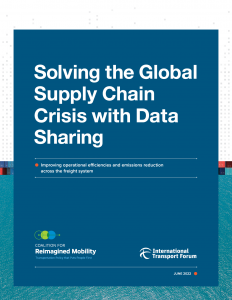Solving the Global Supply Chain Crisis with Data Sharing
Improving operational efficiencies and reducing emissions across the freight system
June 28, 2022
Marla Westervelt, Rachel Aland, and Isabelle Dupraz
 Our livelihoods and the global economy depend on functioning and resilient global supply chains. In the face of geopolitical turmoil, natural disasters, and disease, we have seen how unforeseen disruptions and lagging modernization comes at a cost to people everywhere.
Our livelihoods and the global economy depend on functioning and resilient global supply chains. In the face of geopolitical turmoil, natural disasters, and disease, we have seen how unforeseen disruptions and lagging modernization comes at a cost to people everywhere.
Starting in 2020, the COVID-19 pandemic created significant challenges and impacts for unprepared operators of the global freight sector. Antiquated, impractical, and siloed processes highlighted the breakdown of reliable access to goods for people, businesses, and governments worldwide.
Then in 2022 Russia invaded Ukraine, compounding the pressure on the entire freight system, while exacerbating a global oil crisis that further underscored the need to reduce our dependence on fossil fuel.
Solving the Global Supply Chain Crisis with Data Sharing report defines how the global freight sector can forge a new path to reinvention, resilience, and sustainability through digitalization enabled by freight data exchange.
It finds that freight data exchange can reduce global freight emissions by 22 percent and provides global-level recommendations for policy makers to lead the way towards a more resilient future for global supply chains.
KEY FINDINGS
Clean Fuel and Electrification Are Not Enough to Decarbonize the Freight Sector
ReMo partnered with the International Transport Forum (ITF) to use its globally renowned freight emissions model to quantify emissions reductions that could be generated by data exchange to share logistical data in near real-time and streamline the supply chain. The impact is significant, including:
- A reduction of sea freight emissions by 280 million tons of carbon per year and road freight emissions by 360 million tons of carbon per year;
- Elimination of 2.5 billion barrels of oil per year; and
- A 6-percent cost savings per ton-kilometer.
A Freight Data Exchange Standard Will Increase Freight System Resilience and Sustainability While Reducing Oil Dependence.
Digitalization of the freight sector has lagged as market and regulatory failures have created barriers to change. The time for action is now.
The Coalition for Reimagined Mobility calls on policymakers to take the following steps immediately:
- Require the use of freight data exchange standards as a condition for accessing ports.
- Deploy Freight Data Exchange Standards that communicates near real-time operational data.
- Allocate authority to national governments and ports to require the use of Freight Data Exchange Standards.
- Allocate seed funding to ports and industry stakeholders to deploy data exchange standard pilots and projects.
- Initiate and fund targeted intermodal exchange and smart steaming programs to realize near-term emissions reduction benefits.

